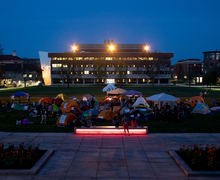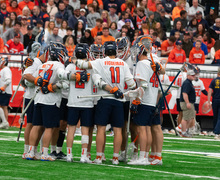SASSE to challenge the gender binary in annual ‘Vagina Monologues’ performance
Courtesy of Students Advocating Sexual Safety and Empowerment
When Katie Pataki introduces the 14th annual performance of “The Vagina Monologues” at Syracuse University, she will make clear the future is not female. To SASSE, it’s nonbinary.
Students Advocating Sexual Safety and Empowerment will host its performance of activist Eve Ensler’s award-winning play — which explores women’s sexuality, abuse and confidence — at 7 p.m. Friday in Hendricks Chapel. In collaboration with the LGBT Resource Center, SASSE has adjusted this year’s programming to be more inclusive due to critiques of “The Vagina Monologues’” portrayal of gender through a white, cisnormative lens.
Pataki, SASSE president and director of the performance, said the play can be uncomfortable, but that there’s a healing power in encouraging the audience to think critically about the issues it covers.
“SASSE understands the critiques but feels it’s an empowering play, because not only does it have value — you’re able to bring up the problems the play showcases,” said Pataki, a senior sociology and women’s and gender studies double major. “If someone is hesitant because they think their politics are different or heard there are problems with inclusivity, I would say, ‘Go, but remain critical.’”
Katie Pataki directs a rehearsal of “The Vagina Monologues” in Crouse-Hinds Hall. Molly Gibbs | Asst. Photo Editor
Each year, “The Vagina Monologues” features a spotlight performance to end the play. Lashelle Ramirez, a senior art photography student who identifies as nonbinary, will recite an original untitled poem this year about their fluidity between femininity and masculinity.
Ramirez hasn’t performed in The Vagina Monologues in past years because they didn’t want to recite a script in which they would have to call themself a woman. Then SASSE approached them and asked them to do the spotlight piece.
“This is my chance to prove myself and prove to other people, especially people who are just like me or are having similar issues like me with their gender identities, to see we can have a voice in society as well,” Ramirez said.
About a week after the performance, Ramirez will facilitate a healing space with SASSE that will be open only to non-cis and nonbinary people. The purpose of the space will be to discuss the play’s themes and implications. SASSE will also host a general body meeting, open to all community members, to examine the play.
“The SASSE e-board is all cis women, so none of the e-board will be present,” Pataki said. “We’re simply opening up a healing space so there’s a place that doesn’t have the pressures associated with being the only trans voice in a room wanting to talk about that.”
Alexa Díaz | Editor-in-chief
Tula Goenka, SASSE’s faculty adviser and a professor in the S.I. Newhouse School of Public Communications, knows the monologues by heart after attending a decade of performances. She said she’s consistently struck by the play’s power. Still, this year stands out.
“It’s relevant each and every year, but especially in today’s climate with the current administration that is in power and how misogynistic it is and how everyone involved dismisses sexual and domestic violence,” Goenka said. “And with the #MeToo conservation that started this fall as well.”
The #MeToo movement also encouraged Goenka to host the sixth annual SU Rising: Stop Sexual Abuse candlelight vigil, which will be held for individuals affected by sexual assault, in conjunction with “The Vagina Monologues.” The vigil, which was inspired by Ensler’s One Billion Rising campaign to end violence against women, will be held before “The Vagina Monologues” on Friday at Hendricks Chapel from 5:30-6:30 p.m.
“The biggest thing is to become aware that these are shared experiences. And we need to stand together and rise up together,” said Goenka, who serves on the Chancellor’s Task Force on Sexual and Relationship Violence and is a co-founder of SU Rising. “We need to rise up together to comfort each other — to honor the people who are victims and survivors.”
Above all, organizers of SU Rising and “The Vagina Monologues” hope people of all genders will come together for an evening about empowerment, healing and solidarity.
Said Goenka: “It’s about a change of rape culture. That’s really the final goal of it.”
Published on February 15, 2018 at 12:53 am
Contact Alexa: adiaz02@syr.edu | @alexalucina






